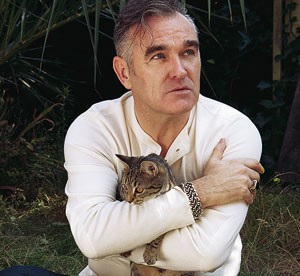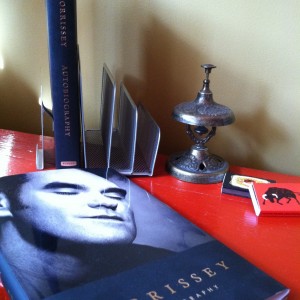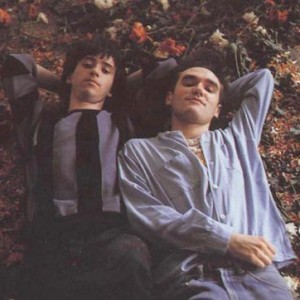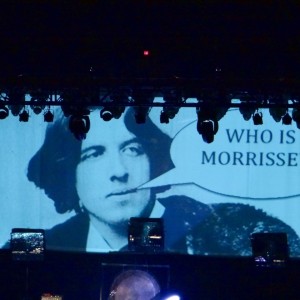Forgiveness
Morrissey has been much on my mind. (This piece is a continuation of its preceding post, called Flight.)

He’s re-booked Lincoln’s beautiful Rococo Theatre and I am happy to report that we have a table and seats reserved for the upcoming May show. While anticipating the concert and having just finished his book, I decided to share a few thoughts in review.
Okay – a deep breath…
Criticism comes naturally to some. Probably because I am thin-skinned, it does not come to me so easily. I tend to think of myself this way: I am loyal. When I am IN, I am ALL IN. For example, I bristle at the lukewarm, “What have you done for me lately?” attitudes that people take about their once-revered entertainers and athletes. In fact, I despise that. But after only short reflection, I fear that in this regard I am as guilty as anyone else – regularly discarding my favored stars of music and film once I judge them to have overreached or to have become too popular.
This is a confession, and not an easy one. It is difficult because in these moments of painful recognition – when we realize that we are thinking and behaving in ways that we dislike – to paraphrase my old friend Brent, “we cast the darkest shadows on ourselves.” It is when we hate most intensely within ourselves those outward qualities that we have come to hate in other people.

Morrissey, Autobiography (New York: Penguin, 2013) 454 pages.
I love this artist, and I wanted to love his book, so writing anything even remotely negative about Morrissey’s long, dense, and poetic Autobiography feels a bit like betrayal. But here goes…
One of my idols is a man who, throughout his life, has come to feel so consistently let down and unsatisfied, (perceived as a “spectacle of misfortune,”) that his book was difficult to penetrate and somewhat harder to enjoy. I knew better than to expect a bright warm jaunt through the life of an international pop icon, but the clouds cannot always be greyest over Morrissey, can they? Sometimes the sun must shine, and I really had hoped for more joy and more good times.
Vain hope. The book is generally rather dull – it casts the pervasive unwelcoming and perturbed vibe of misanthropy. Besides the fact of being ALWAYS misunderstood, it seems there are only a few things about which he is certain. Among these are his perfect taste, strong opinions, and his vast talent. Everyone else mostly falls short.
About many people and situations he is sometimes merely bitchy:
“… Siouxsie [Sioux] is wearing reflective sunglasses so that her eyes are not visible to anyone, and instantly her demands are barked out with a voice of punished ferocity. Within eight seconds she seems to have alienated everyone in the room…”
Often he is completely savage. During a “life-giving” festival appearance by the Smiths, Morrissey writes of Factory Records founder and the festival’s organizer, Tony Wilson:
“…[Wilson] flutters and fumes backstage … and he spends the remainder of his life with a Morrissey–Smiths wasting disease of the lower limbs, whilst oddly admitting that his big mistake in life was that he didn’t sign the Smiths to Factory…”
Adding to the book’s difficulty was the stylistic lack of clear breaks for chapters, stories, or themes. Other than some occasional double spacing, the episodes run into one another. The book’s only real pattern is chronology – so besides things being laid out more or less in order, we don’t have much in the way of signals about how to read, for instance, when has one bit stopped and another is about to begin.
Another stylistic source of annoyance, (and here, writes the wee blogging pot to the mega-star kettle,) the prose of Autobiography is mostly overwrought. It is well done in bits and pieces, but to read at any length, it is swampy:
“The post-volcanic black worn by the school nuns and their monastic sheepish priests shapes the subtle effects of oppression; they know their time has gone, and the spinster-faced have seen the door close for the last time.”
In many ways the contents of his book are put together like the lyrics of his songs – remarkably observed pieces of a life that make the ordinary seem extraordinary – partly because the observations are relatable. But in the assembly the contents run and mush together. I wonder what kind of book Morrissey may have come up with if he’d structured it differently. For instance, what if he’d broken it into manageable and defined episodes or chapters? He may have presented the world with a series of beautiful, cohesive, and coherent chapters – think of The Beatles’ songs Norwegian Wood flowing into You Won’t See Me on Rubber Soul; nearly perfect songs that one can relate to, and that are two or three minutes long. Instead we find Freebird running into Truck Drivin’ Man by Lynyrd Skynyrd (Skynyrd’s Innyrds) a couple of tortuous messes that clock at ten and five minutes respectively.

To be fair, there were some lovely, sunny pages in Autobiography. It was fun and familiar to read of his youthful thrall to poets, music, and musicians. He gives favorable impressions of other pop stars: he mostly worships New York Dolls; he vacillates in affection for but mainly respects the artistry of David Bowie and Bryan Ferry; he adores Chrissie Hynde and Nancy Sinatra. And there are heartbreaking losses, friendships, and artistic triumphs – for example there is genuine warmth and closeness that he sometimes felt with his Smiths co-founder, Johnny Marr. But the demeanor of Morrissey’s cloudy public persona, made for far more gloomy pages than bright ones.

I do love this artist – few have meant so much to me. It is a bad mistake sometimes to meet one’s idols – and often dangerous to learn too much about them. It’s a mistake I continue to make.
His book was a miss for me, but I can’t wait to see him perform again soon. By then I will have forgiven Morrissey.
His lyrical genius, wonderfully distinct voice, and peerless commitment to material have made Morrissey a huge international star, and one of my favorites for all-time. Ranging from early to recent, here are a few examples of his mastery:
http://bit.ly/1nuquqH – The Headmaster Ritual by the Smiths, from Meat is Murder, (Rough Trade/Sire 1985).
http://bit.ly/QGdBMK – Half a Person by the Smiths, from Louder Than Bombs, (Rough Trade/Sire 1987).
http://bit.ly/1ijMv8Q – Dial-a-cliché by Morrissey, from Viva Hate (HMV/Sire 1988).
http://bit.ly/1iWyrBH – Black Cloud by Morrissey, from Years of Refusal, (Polydor Records 2009).
I think his chart numbers are surprising: http://bit.ly/1fbfyvW
– 25 april 2014